人教版高中英语选修七课件:Unit4 Sharing Reading(共28张PPT)
文档属性
| 名称 | 人教版高中英语选修七课件:Unit4 Sharing Reading(共28张PPT) | 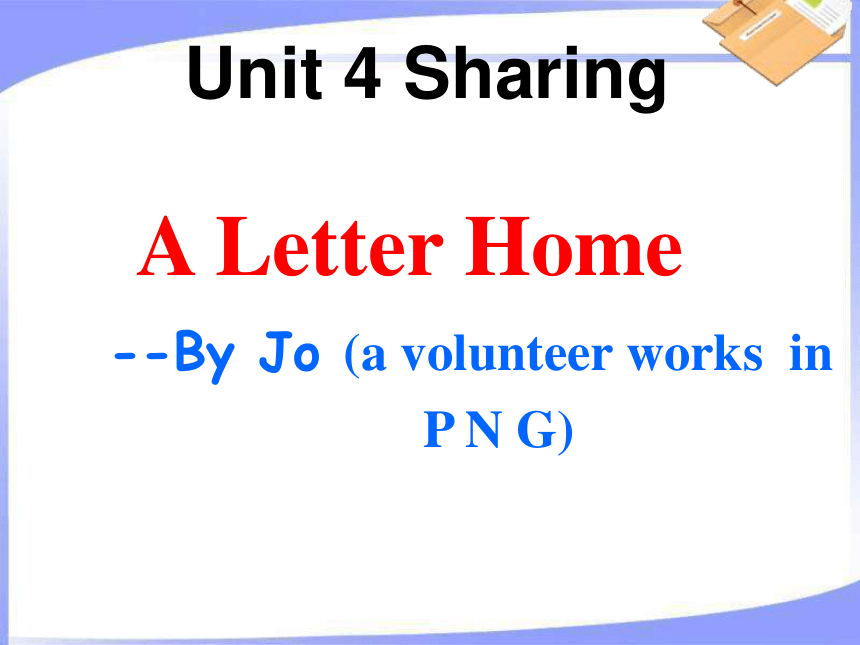 | |
| 格式 | zip | ||
| 文件大小 | 1023.5KB | ||
| 资源类型 | 教案 | ||
| 版本资源 | 人教版(新课程标准) | ||
| 科目 | 英语 | ||
| 更新时间 | 2019-12-18 16:40:47 | ||
图片预览

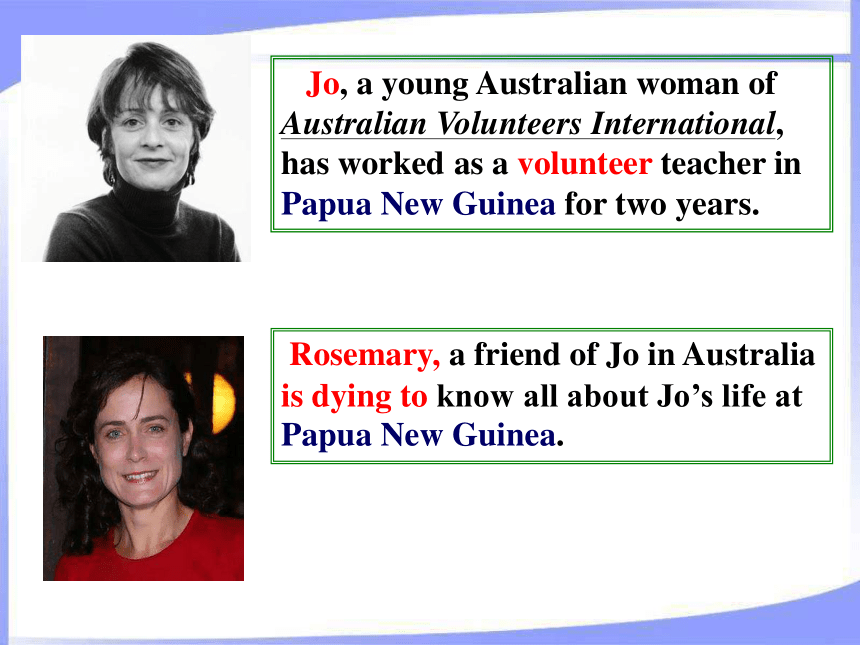
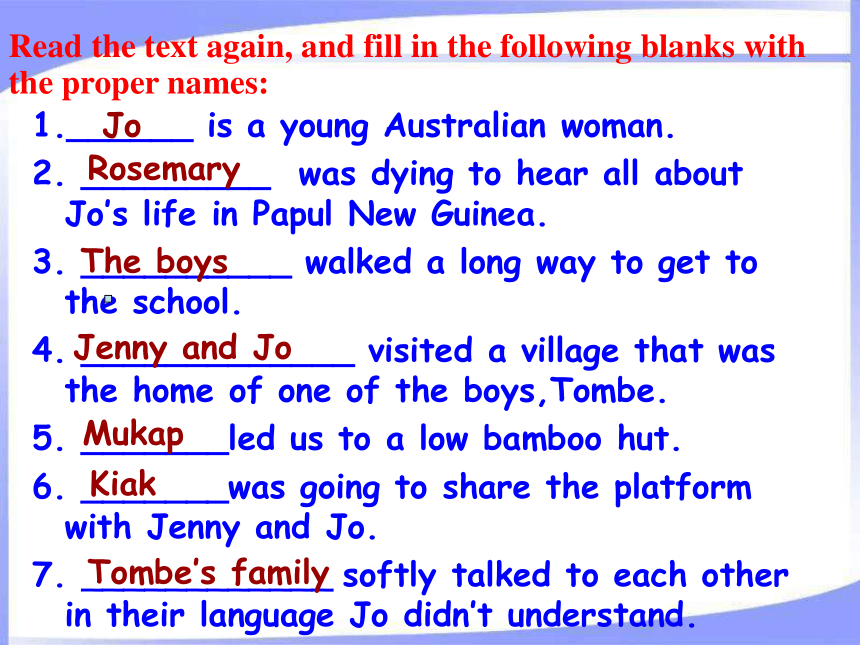
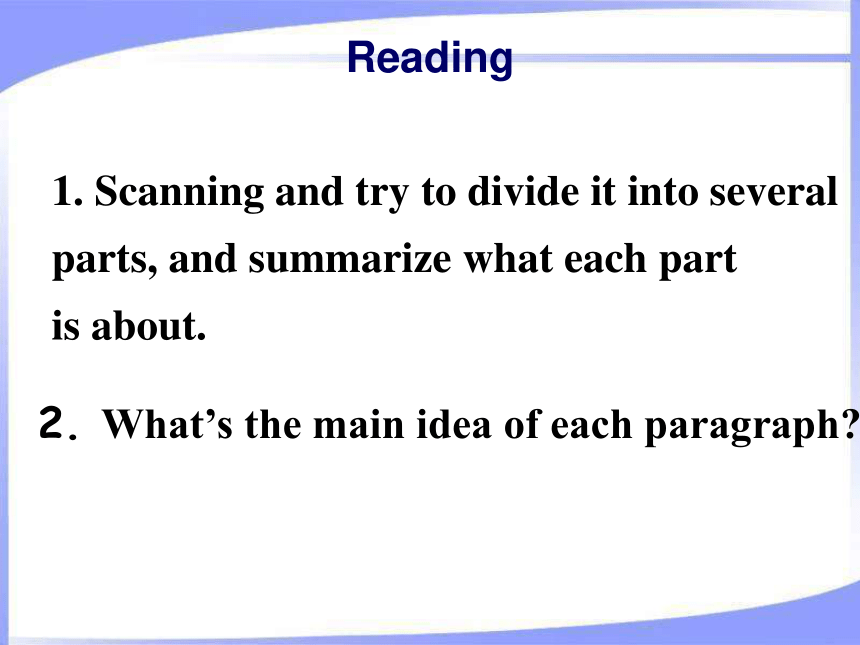
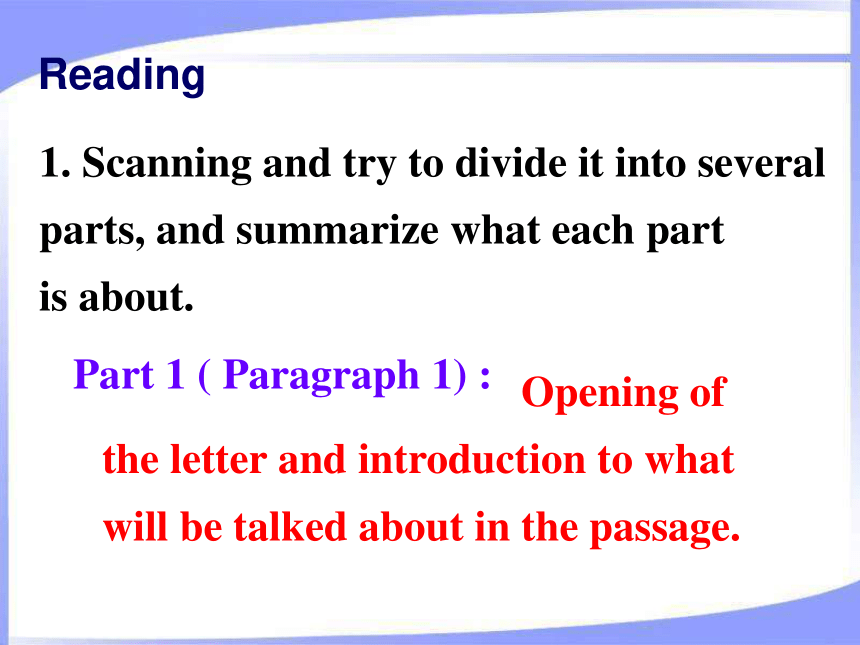
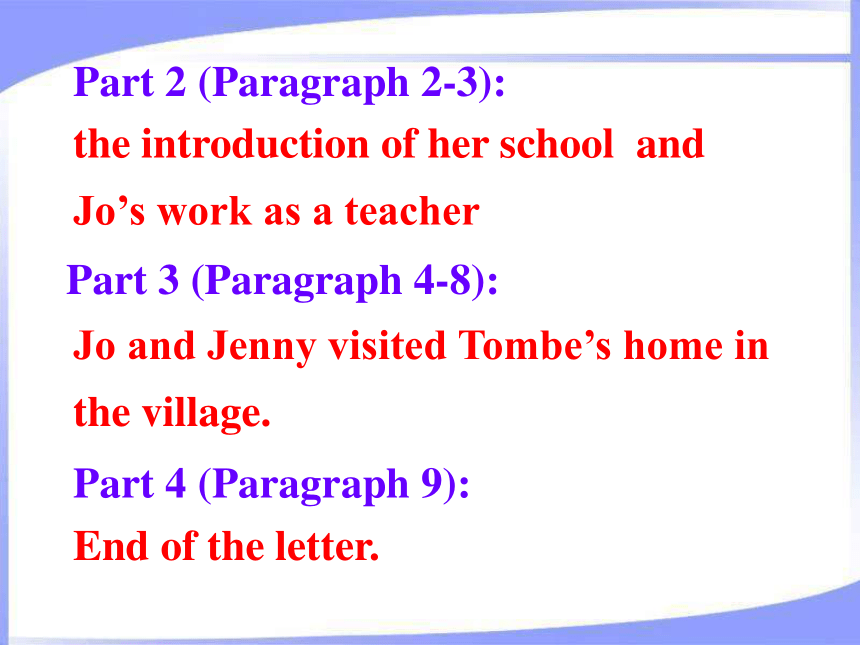

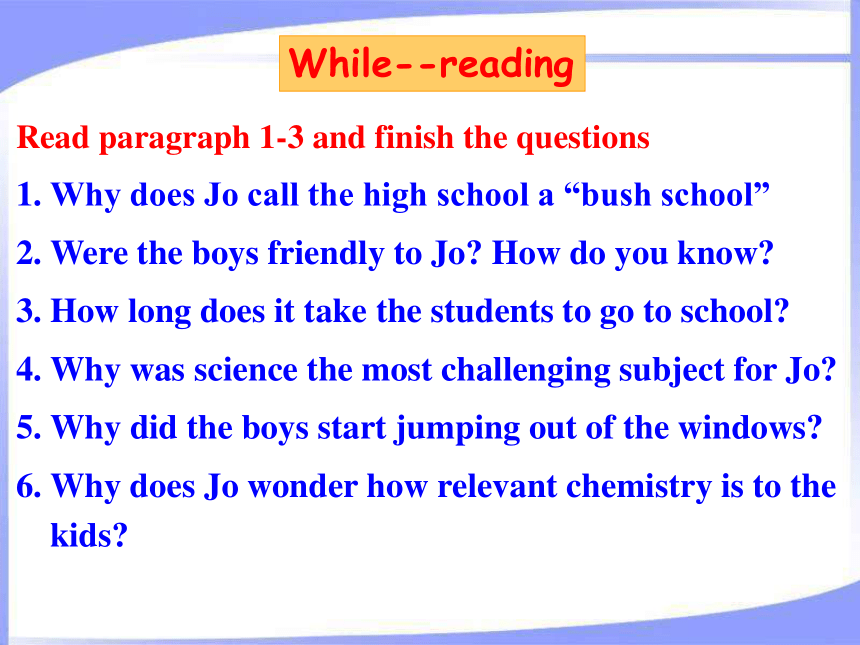
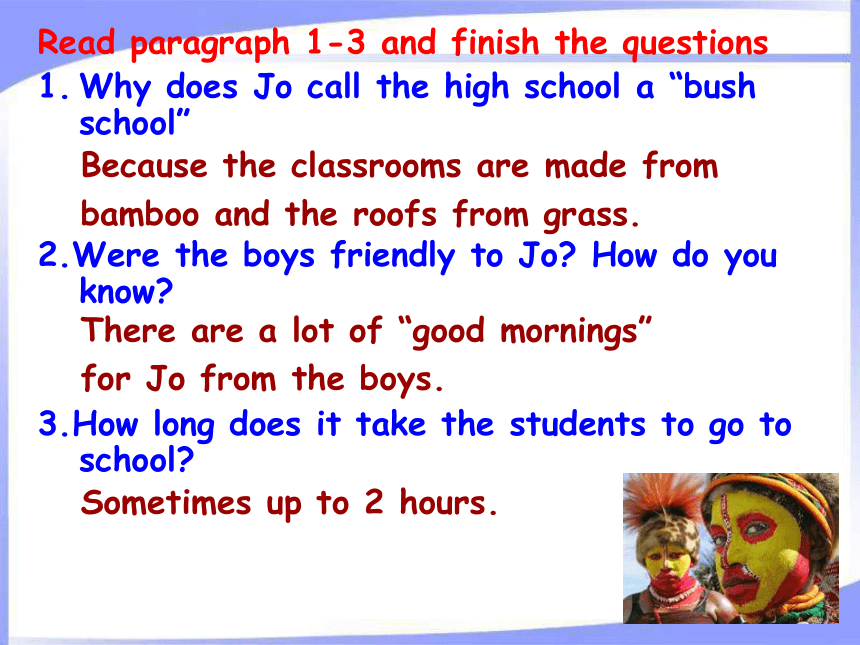
文档简介
(共28张PPT)
A Letter Home
--By Jo (a volunteer works in
P N G)
Unit 4 Sharing
Rosemary, a friend of Jo in Australia
is dying to know all about Jo’s life at
Papua New Guinea.
Jo, a young Australian woman of
Australian Volunteers International,
has worked as a volunteer teacher in
Papua New Guinea for two years.
1.______ is a young Australian woman.
2. _________ was dying to hear all about Jo’s life in Papul New Guinea.
3. __________ walked a long way to get to the school.
4. _____________ visited a village that was the home of one of the boys,Tombe.
5. _______led us to a low bamboo hut.
6. _______was going to share the platform with Jenny and Jo.
7. ____________ softly talked to each other in their language Jo didn’t understand.
Read the text again, and fill in the following blanks with the proper names:
Jo
Rosemary
Mukap
Jenny and Jo
Kiak
The boys
Tombe’s family
Reading
1. Scanning and try to divide it into several
parts, and summarize what each part
is about.
2. What’s the main idea of each paragraph?
1. Scanning and try to divide it into several
parts, and summarize what each part
is about.
Opening of the letter and introduction to what will be talked about in the passage.
Part 1 ( Paragraph 1) :
Reading
the introduction of her school and Jo’s work as a teacher
Jo and Jenny visited Tombe’s home in the village.
End of the letter.
Part 2 (Paragraph 2-3):
Part 3 (Paragraph 4-8):
Part 4 (Paragraph 9):
Para 1
Para 2
Para 3
Para 4
Para 5
Para 6
Para 7
Para 8
Para 9
What Jo’s school is like
Poor school conditions
Jo’s first visit to a village
What the hut was like outside and inside
How the villagers cooked their meals
Jo said goodbye to the villagers
The way to deal with leftover food
The ending of the letter
What’s the main idea of each paragraph?
The purpose of the letter
Read paragraph 1-3 and finish the questions
Why does Jo call the high school a “bush school”
Were the boys friendly to Jo? How do you know?
How long does it take the students to go to school?
Why was science the most challenging subject for Jo?
Why did the boys start jumping out of the windows?
Why does Jo wonder how relevant chemistry is to the kids?
While--reading
Read paragraph 1-3 and finish the questions
Why does Jo call the high school a “bush school”
2.Were the boys friendly to Jo? How do you know?
3.How long does it take the students to go to school?
Because the classrooms are made from bamboo and the roofs from grass.
Sometimes up to 2 hours.
There are a lot of “good mornings” for Jo from the boys.
Why was science the most challenging subject for Jo?
Why did the boys start jumping out of the windows?
Why does Jo wonder how relevant chemistry is to the kids?
Because most of the boys will go back to their villages after year 8 and she thinks chemistry may make little difference to the kids’ life.
There was no equipment.
The boys never came across anything like the bubbling mixture.
Read Paragraph 4-8 and finish the chart
Type of houses Diet
Family relationships Possessions
Cooking methods Agriculture
Sleeping arrangement Beliefs
Types of
houses
Family
relationships
Cooking
methods
Sleeping arrangements
Men’s hut is a _____________ hut with _____________________. No _____, small ________. Floor was covered with ___________.
low bamboo
grass sticking out of the roof
windows
doorway
fresh grass
Everyone seemed to be a ________of Tombe’s . (large extended family)
relative
____________ are placed in an _______, then _________ are placed in the drum, covered with ____________ and _________.
Hot stones
oil drum
vegetables
banana leaves
steamed
Kiak usually slept in her _________. A newly made ________ for Jenny and me to sleep on.
own hut
platform
Diet
Possessions
Agriculture
Beliefs
_____________, _____ and ________.
sweet potato
corns
greens
I could only see one _____,a few ________ and ______ and a couple of ______.
tin plates
cups
jars
Tools are very basic. There is no __________.
machinery
The villagers believe that any ________attract __________ in the night so the food is _________in the can and the can is then ________ of the hut.
leftovers
evil spirits
dried up
thrown out
broom
Tombe comes from a
_______ village where
people speak special
language. People
live in the hut which
has no _________ and
the doorway was _______.
The main food they eat
are ________, ______
and _______. Villagers
believe that ________
attract evil spirit in the
night.
Jo’s school is a _____
school whose classrooms
are made of _________
and roofs of _____. There
is no _________ or ______,
even no__________.
Without __________,
the students have no
______ of doing experiment.
Most of the students will
be going back to their
villages after ________.
Local Village
High school
bush
bamboo
grass
electricity
water
textbooks
equipment
concept
year 8
remote
windows
narrow
kaukau
corn
greens
leftovers
conditions
lives & customs
With a better life in Australia,
why do you think Jo was willing
to be a volunteer in Papua New
Guinea?
Afterthought
Discussion: Would you like to work as a
volunteer in a poor area?
I think I will be a volunteer in a poor area.
Whenever I saw the poor living state of the
poor in the western areas and mountainous
areas, I was eager to do something for them.
All men are created equal. But they can’t get
what we can enjoy. What a pity! If possible,
I will try to help.
…have walked a long way, sometimes up to
two hours, to get to the school.
up to = as many as/ as much as
e.g. He can earn up to $50,000 a year.
up to 还可以表示: 1) up until 一直
e.g. She lived at home right up to/until she got
married.
2) good enough for sth. 胜任
e.g. I am not sure if she is really up to that job.
3)由……负责
e.g. It’s up to her to decide whether or not to go
on the course.
imaginative adj. 富有想象力的, 爱想象的
an imaginative child/writer有想象力的孩子/
富有想象力的作家
imaginary adj. 想象中的,假想的
imaginable adj. 可想象的 imagine v. 设想
imagination n. 想象力 image n. 雕像,肖像
The boys who had never come across anything…
come across 偶然遇见/发现
I came across some interesting books in the room.
I came across an old friend I hadn’t seen for years.
come about 发生
This situation should never have come about.
come along 进展
How is your work coming along?
come back 回来, 折回 come round 定期发生
come from 来自 come to 来到, 结果是
come off 从……离开, 脱落 come out 出来, 出版
come up 走过来, 走近 come over 过来
Everyone seemed to be a relative of Tombe’s.
每个人都好像是Tombe的亲戚。
seem 似乎, 看来
1) 跟不定式
I seemed to hear a voice in the distance.
He seemed to be in a great hurry.
2) 跟形容词或分词
He seems quite happy.
Titanic seems _____ an interesting film.
A . is B. are C. be D. to be
D
3) 后接 (to sb.) that 从句, 但主语是it。
It seems to me that there is something strange about the case.在我看来这件案子有点奇怪。
It seems that you are lying. 看来你在撒谎吧。
10. Tomber’s father, Mukap, led us to his house, a
low bamboo hut with grass sticking out of the room…
Tomber的父亲Mukap领着我们到了他的房子,
一间低矮的房顶外长满草的小竹屋,
独立主格结构:1) with的复合结构 (with+ 宾语+ 宾补)
with + n. + doing ( doing表示 with 后名词发生
的动作, 此名词为动作的执行者)
He lay there with his eyes looking at the sky.
with + n. + done (done 和with后面的宾语构成
动宾关系, 此宾语是动作的承受者)
The thief was brought in with his hands tied back.
with + n. + to do 动词不定式表示目的,
或将发生, 未发生的事。
With all these mouth to feed, he didn’t know
what to do.
With five minutes to go before the last train
left, we arrived at the station.
with + n. + prep. phrase
The teacher came in with some textbooks
under her arm.
with + n. + adj
When he is eating, he doesn’t speak with his
mouth full of food.
2) stick out 突出, 伸出
stick out for sth. 坚持要求某事物
stick to sth/doing sth. 坚持; 遵守; 信守
stick at sth. 坚持不懈
stick with sb. 继续支持某人
stick up 向上突起, 坚起
I stuck my tongue out at him. 我对他伸出舌头。
He is guilty and it sticks out a mile. 很明显他是有罪的。
He hates the job – but he’s determined to stick it out
because he needs the money.
他讨厌那份工作—但因为需要钱, 只好坚持干下去。
13. It was such a privilege to have spent a day
with Tombe’s family.
privilage: a special benefit that is available
only to particular person.
enjoy privileges 享受特权
have the privilege of … 有… …的特权
as a special privilege 作为特权许可
by special privilege 根据特权
e.g. It is a privilege for Tom to watch the
opening ceremony of Beijing Olympic Games.
18. It’s getting late and I have to prepare
tomorrow’s lessons.
prepare sth. 准备某事
prepare for sth. 为……做准备
prepare sb. for sth. 使某人为某事做好准备
get/be prepared to do 有能力且愿意做某事
be prepared for sth. 为……做好准备
make preparations for 为……做准备
in preparation 准备中
辨析: prepare与prepare for
prepare 准备; 谓语动作直接体现在宾语上。
prepare for 为……做准备, for的宾语一般
只是谓语动作要达到的目标。
The teacher is preparing a lesson.
老师在备课。
The teacher is preparing for a lesson.
老师正在为上课做准备。
A Letter Home
--By Jo (a volunteer works in
P N G)
Unit 4 Sharing
Rosemary, a friend of Jo in Australia
is dying to know all about Jo’s life at
Papua New Guinea.
Jo, a young Australian woman of
Australian Volunteers International,
has worked as a volunteer teacher in
Papua New Guinea for two years.
1.______ is a young Australian woman.
2. _________ was dying to hear all about Jo’s life in Papul New Guinea.
3. __________ walked a long way to get to the school.
4. _____________ visited a village that was the home of one of the boys,Tombe.
5. _______led us to a low bamboo hut.
6. _______was going to share the platform with Jenny and Jo.
7. ____________ softly talked to each other in their language Jo didn’t understand.
Read the text again, and fill in the following blanks with the proper names:
Jo
Rosemary
Mukap
Jenny and Jo
Kiak
The boys
Tombe’s family
Reading
1. Scanning and try to divide it into several
parts, and summarize what each part
is about.
2. What’s the main idea of each paragraph?
1. Scanning and try to divide it into several
parts, and summarize what each part
is about.
Opening of the letter and introduction to what will be talked about in the passage.
Part 1 ( Paragraph 1) :
Reading
the introduction of her school and Jo’s work as a teacher
Jo and Jenny visited Tombe’s home in the village.
End of the letter.
Part 2 (Paragraph 2-3):
Part 3 (Paragraph 4-8):
Part 4 (Paragraph 9):
Para 1
Para 2
Para 3
Para 4
Para 5
Para 6
Para 7
Para 8
Para 9
What Jo’s school is like
Poor school conditions
Jo’s first visit to a village
What the hut was like outside and inside
How the villagers cooked their meals
Jo said goodbye to the villagers
The way to deal with leftover food
The ending of the letter
What’s the main idea of each paragraph?
The purpose of the letter
Read paragraph 1-3 and finish the questions
Why does Jo call the high school a “bush school”
Were the boys friendly to Jo? How do you know?
How long does it take the students to go to school?
Why was science the most challenging subject for Jo?
Why did the boys start jumping out of the windows?
Why does Jo wonder how relevant chemistry is to the kids?
While--reading
Read paragraph 1-3 and finish the questions
Why does Jo call the high school a “bush school”
2.Were the boys friendly to Jo? How do you know?
3.How long does it take the students to go to school?
Because the classrooms are made from bamboo and the roofs from grass.
Sometimes up to 2 hours.
There are a lot of “good mornings” for Jo from the boys.
Why was science the most challenging subject for Jo?
Why did the boys start jumping out of the windows?
Why does Jo wonder how relevant chemistry is to the kids?
Because most of the boys will go back to their villages after year 8 and she thinks chemistry may make little difference to the kids’ life.
There was no equipment.
The boys never came across anything like the bubbling mixture.
Read Paragraph 4-8 and finish the chart
Type of houses Diet
Family relationships Possessions
Cooking methods Agriculture
Sleeping arrangement Beliefs
Types of
houses
Family
relationships
Cooking
methods
Sleeping arrangements
Men’s hut is a _____________ hut with _____________________. No _____, small ________. Floor was covered with ___________.
low bamboo
grass sticking out of the roof
windows
doorway
fresh grass
Everyone seemed to be a ________of Tombe’s . (large extended family)
relative
____________ are placed in an _______, then _________ are placed in the drum, covered with ____________ and _________.
Hot stones
oil drum
vegetables
banana leaves
steamed
Kiak usually slept in her _________. A newly made ________ for Jenny and me to sleep on.
own hut
platform
Diet
Possessions
Agriculture
Beliefs
_____________, _____ and ________.
sweet potato
corns
greens
I could only see one _____,a few ________ and ______ and a couple of ______.
tin plates
cups
jars
Tools are very basic. There is no __________.
machinery
The villagers believe that any ________attract __________ in the night so the food is _________in the can and the can is then ________ of the hut.
leftovers
evil spirits
dried up
thrown out
broom
Tombe comes from a
_______ village where
people speak special
language. People
live in the hut which
has no _________ and
the doorway was _______.
The main food they eat
are ________, ______
and _______. Villagers
believe that ________
attract evil spirit in the
night.
Jo’s school is a _____
school whose classrooms
are made of _________
and roofs of _____. There
is no _________ or ______,
even no__________.
Without __________,
the students have no
______ of doing experiment.
Most of the students will
be going back to their
villages after ________.
Local Village
High school
bush
bamboo
grass
electricity
water
textbooks
equipment
concept
year 8
remote
windows
narrow
kaukau
corn
greens
leftovers
conditions
lives & customs
With a better life in Australia,
why do you think Jo was willing
to be a volunteer in Papua New
Guinea?
Afterthought
Discussion: Would you like to work as a
volunteer in a poor area?
I think I will be a volunteer in a poor area.
Whenever I saw the poor living state of the
poor in the western areas and mountainous
areas, I was eager to do something for them.
All men are created equal. But they can’t get
what we can enjoy. What a pity! If possible,
I will try to help.
…have walked a long way, sometimes up to
two hours, to get to the school.
up to = as many as/ as much as
e.g. He can earn up to $50,000 a year.
up to 还可以表示: 1) up until 一直
e.g. She lived at home right up to/until she got
married.
2) good enough for sth. 胜任
e.g. I am not sure if she is really up to that job.
3)由……负责
e.g. It’s up to her to decide whether or not to go
on the course.
imaginative adj. 富有想象力的, 爱想象的
an imaginative child/writer有想象力的孩子/
富有想象力的作家
imaginary adj. 想象中的,假想的
imaginable adj. 可想象的 imagine v. 设想
imagination n. 想象力 image n. 雕像,肖像
The boys who had never come across anything…
come across 偶然遇见/发现
I came across some interesting books in the room.
I came across an old friend I hadn’t seen for years.
come about 发生
This situation should never have come about.
come along 进展
How is your work coming along?
come back 回来, 折回 come round 定期发生
come from 来自 come to 来到, 结果是
come off 从……离开, 脱落 come out 出来, 出版
come up 走过来, 走近 come over 过来
Everyone seemed to be a relative of Tombe’s.
每个人都好像是Tombe的亲戚。
seem 似乎, 看来
1) 跟不定式
I seemed to hear a voice in the distance.
He seemed to be in a great hurry.
2) 跟形容词或分词
He seems quite happy.
Titanic seems _____ an interesting film.
A . is B. are C. be D. to be
D
3) 后接 (to sb.) that 从句, 但主语是it。
It seems to me that there is something strange about the case.在我看来这件案子有点奇怪。
It seems that you are lying. 看来你在撒谎吧。
10. Tomber’s father, Mukap, led us to his house, a
low bamboo hut with grass sticking out of the room…
Tomber的父亲Mukap领着我们到了他的房子,
一间低矮的房顶外长满草的小竹屋,
独立主格结构:1) with的复合结构 (with+ 宾语+ 宾补)
with + n. + doing ( doing表示 with 后名词发生
的动作, 此名词为动作的执行者)
He lay there with his eyes looking at the sky.
with + n. + done (done 和with后面的宾语构成
动宾关系, 此宾语是动作的承受者)
The thief was brought in with his hands tied back.
with + n. + to do 动词不定式表示目的,
或将发生, 未发生的事。
With all these mouth to feed, he didn’t know
what to do.
With five minutes to go before the last train
left, we arrived at the station.
with + n. + prep. phrase
The teacher came in with some textbooks
under her arm.
with + n. + adj
When he is eating, he doesn’t speak with his
mouth full of food.
2) stick out 突出, 伸出
stick out for sth. 坚持要求某事物
stick to sth/doing sth. 坚持; 遵守; 信守
stick at sth. 坚持不懈
stick with sb. 继续支持某人
stick up 向上突起, 坚起
I stuck my tongue out at him. 我对他伸出舌头。
He is guilty and it sticks out a mile. 很明显他是有罪的。
He hates the job – but he’s determined to stick it out
because he needs the money.
他讨厌那份工作—但因为需要钱, 只好坚持干下去。
13. It was such a privilege to have spent a day
with Tombe’s family.
privilage: a special benefit that is available
only to particular person.
enjoy privileges 享受特权
have the privilege of … 有… …的特权
as a special privilege 作为特权许可
by special privilege 根据特权
e.g. It is a privilege for Tom to watch the
opening ceremony of Beijing Olympic Games.
18. It’s getting late and I have to prepare
tomorrow’s lessons.
prepare sth. 准备某事
prepare for sth. 为……做准备
prepare sb. for sth. 使某人为某事做好准备
get/be prepared to do 有能力且愿意做某事
be prepared for sth. 为……做好准备
make preparations for 为……做准备
in preparation 准备中
辨析: prepare与prepare for
prepare 准备; 谓语动作直接体现在宾语上。
prepare for 为……做准备, for的宾语一般
只是谓语动作要达到的目标。
The teacher is preparing a lesson.
老师在备课。
The teacher is preparing for a lesson.
老师正在为上课做准备。
